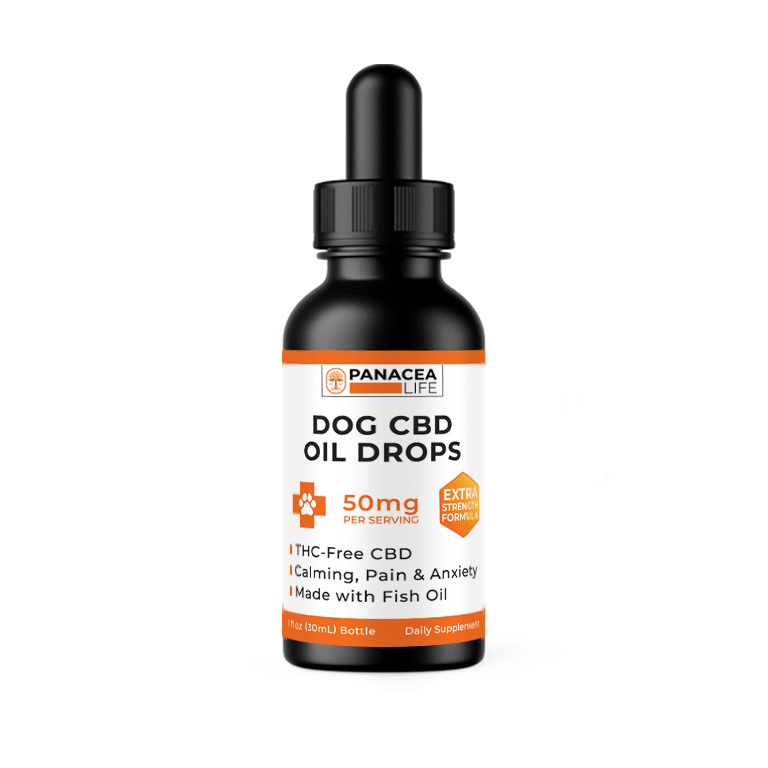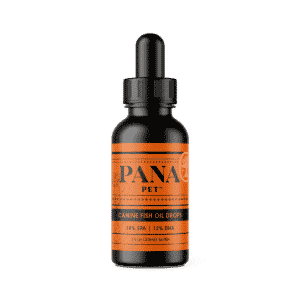Want to get on board the cannabidiol (CBD) pet wellness train but aren’t sure how the side effects of CBD oil in dog? Read on below to find out.
What is CBD?
CBD is a naturally occurring substance found in the cannabis plant. It is non-psychoactive in the sense that it doesn’t get you or your dog high and doesn’t cause the feeling of intoxication.

How does CBD affect dogs?
This formal study looks at the effects of CBD in dogs. Others look at the CBD’s effects on other animals or humans, and we draw conclusions from those studies about what could work for dogs and how CBD may affect dogs. What we do know for sure is that CBD interacts with the Endocannabinoid System (ECS), which is responsible for maintaining homeostasis, meaning bringing physiological systems into balance. Here are a few ways in which CBD may affect dogs:
It may relieve inflammation issues

-

Dog CBD Oil Drops
From: $14.95 Select options This product has multiple variants. The options may be chosen on the product page -

Canine Fish Oil Drops
$14.95 Add to cart
The anti-inflammatory properties of CBD are well-known. These anti-inflammatory properties of CBD result due to its interaction with the receptors in the immune cells. The receptor CBD interacts with is called CB2 (cannabinoid 2 receptor), which helps regulate different types of immune responses, including anti-inflammatory ones.
A European Journal of Pharmacology study suggests that the ECS plays an integral role in inflammation management, and as mentioned before, CBD interacts with the ECS and increases the efficiency of the cell-signaling system. Another study suggests that CBD temporarily augmments the function of anandamide, a endo-cannabinoid (cannabinoid naturally made in the body), that suppresses the pain signals. Increased anandamide levels lead to a reduced feeling of pain. CBD is also considered to have anti-inflammatory effects that may help reduce inflammatory pain, common in diseases like arthritis.
It may work as an anticonvulsant
Using CBD as an anticonvulsant is perhaps the most researched area in cannabis research. CBD and other cannabinoids of the cannabis plant are considered to be effective for reducing seizures, spasms, tremors, and ticks. In fact, that’s the only FDA-approved use of a CBD based drug named Epidiolex. Studies suggest that CBD may be effective for reducing epileptic seizures and for reducing muscle spasticity caused by multiple sclerosis (MS). Another study suggests that CBD may be able to help manage tics and tremors caused due to Tourette’s syndrome.
It may provide a sense of calm
CBD may be effective for relieving anxiety and stress, both of which are common in dogs. Research suggests that CBD interacts with a serotonin receptor called 5-HT1A and increases the level of serotonin in the brain through a separate mechanism, which leads to reduced feelings of anxiety and stress.
It may prevent nausea and vomiting
Data suggest that CBD may be effective for treating nausea and vomiting. Both can occur due to multiple reasons and, if left untreated, may lead to serious health complications, including dehydration, appetite and weight loss, fatigue, lethargy, etc. CBD may reduce nausea and vomiting the same way it reduces anxiousness, by interacting with the 5-HT1A receptor.
Possible side effects of CBD for dogs
As mentioned earlier, there isn’t much scientific data about using CBD for dogs. The possible side effects that your dogs may experience are based on the negative effects of CBD that only a few users experience. The World Health Organization says that CBD is safe for humans and generally doesn’t cause any side effects. The side effects usually occur when a person is using a low-quality CBD product, over-consuming it, or have a sensitivity to CBD.
In order to avoid the side effects of CBD, make sure that you properly dose the CBD you are giving to your dog. Start with a low dose and increase it gradually if necessary. Keep a watch on your dog to see if they are acting differently.
Choosing a CBD product for your dog
There are many different CBD products available in the market, both good and bad, because the Food and Drug Administration doesn’t regulate CBD. Some of those products are good for your dogs, while others can cause serious damage. So how do you make sure that you are choosing the right CBD product?
For starters, you can check if a product is tested by an independent lab and has a certificate of analysis. This information is usually available on the company’s website and on the product as well. These certificates tell you if the product is the same as it is advertised if it contains any harmful elements like heavy metals or pesticides. They also tell you that the product is of the same quality as it is being advertised. Watch out for products containing higher levels of THC, because The American Society for the Prevention of Cruelty to Animals (ASPCA) considers THC to be a toxic substance for both cats and dogs. The lethal dose of THC is around 3 g/kg; however, negative side effects may occur even if your dog consumes a small dose of THC.
The best way to give CBD to your dogs
There are several ways of adding CBD to your dog’s diet. You can buy CBD dog treats from the market and give them to your dog when they do a good boy deed. Not every time, though, because you may end up giving too much CBD to your dog. CBD oil is the other option; it contains a carrier oil, usually hemp or coconut, which our dogs love. You can put a few drops of CBD oil on a spoon and let your dog lick it. You can apply a few drops of CBD on their gums. You can add a few drops of CBD oil in their food, or you can use CBD oil to make dog treats for your dog. Whichever method you choose, properly dose the CBD, and keep an eye out for any negative side effects.
The legality of CBD
The legality of CBD for humans is an entirely different matter that at of dogs and animals. Hemp-derived CBD containing up to 0.3% THC is legal in most of the 50 states of the United States. The legality of other forms of CBD is a bit more complicated. Few states allow both medicinal and recreational use of CBD, and you don’t need a prescription to buy a CBD product. Some states allow you to buy CBD products if you have a prescription from a certified healthcare professional. Other states don’t allow both recreational and medicinal use of CBD, even if you have a prescription.
Conclusion
Before choosing any CBD product, be sure to consult a veterinarian to see if CBD is the right choice for your dog and check your state laws about CBD use. Don’t buy low-quality, cheap CBD products because they may contain harmful elements that can damage your dog’s health. If the veterinarian and the state give you the green light to use CBD for your dog, then make sure to dose it properly. Start with a low dose and increase the dosage weekly or bi-weekly if you think it is necessary. Follow all these steps, and hopefully, you and your dog may benefit from CBD use.












